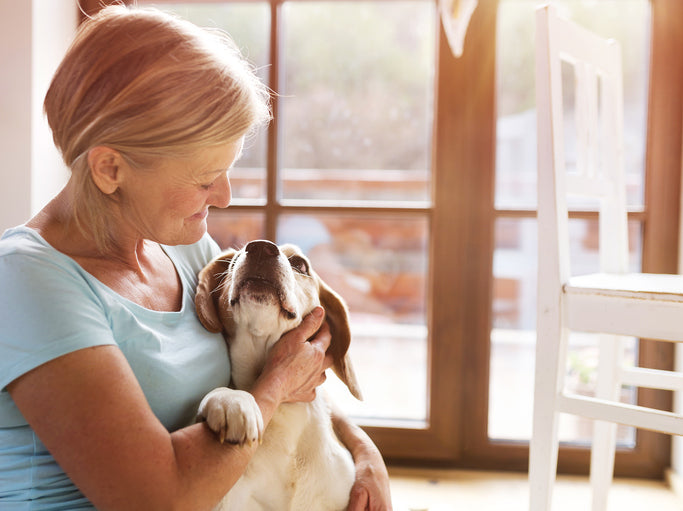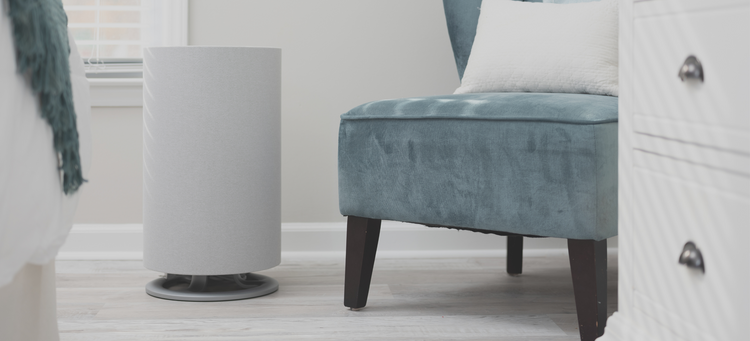Protecting the Elderly from Pet Allergies
Pets can work marvels like reducing anxiety in children, decreasing stress, and increasing social interaction. (Because everyone wants to talk to someone walking a dog!)
Among the elderly, the benefits of a pet can be just as profound. Pet ownership is a source of social and emotional support, and it’s been shown that elderly people with pets may actually be better at completing the tasks of daily living. It’s believed the care-taker role of owning a pet may also increase confidence and a sense of responsibility; essentially, it makes them feel needed, which is essential to all people, including the elderly.
But what if an elderly person has pet allergies? If you are over 65, or have an elderly parent who struggles with pet allergies, is it still possible to reap the reward of pet ownership?
Can someone with a pet keep their animal or even bring one home, despite their allergies?
While much will depend on the severity of the allergies, it is possible to reduce allergic reactions by taking proactive measures. We’re not talking about asthma medication, we’re talking about changes in the home and adjustments to your daily habits that reduce allergic reactions. In the end, this could mean you get to keep your pet while maintaining outstanding health!

Pet Allergies: A Brief Explanation
Pet allergies are a very common form of allergic reactions among the general population. According to the Asthma and Allergy Association of America, roughly 30% of the American population has allergic reactions when they come into contact with cats or dogs. This means a significant portion of the population, including a large number of the elderly, will have issues with pet allergies.Pet allergies are often considered a reaction to a cat or dog’s fur, but they are actually a reaction to tiny skin cells, known as dander, that has flaked off the animal. This animal dander can drift in the air and land anywhere, including table tops, carpet, and furniture.
If you have pet allergies, you essentially suffer from an overactive immune system that is attacking otherwise harmless pet dander. When an allergic reaction occurs, the body goes into defense mode, much the same as it does when a cold virus is present. It attacks the dander and causes swelling, runny noses, congestion, sneezing, itchy or watery eyes, and many of the other symptoms that are commonly associated with hay fever.
Small airborne particles, including pet dander, are small enough to enter into the lungs and can even reach the bloodstream. For many, this can cause severe difficulty breathing, and could cause highly sensitive people to experience deep coughing and wheezing. They could also have a shortness of breath that lasts 15 minutes to a half hour.
If someone has asthma in addition to allergies, the results from an allergic reaction can be severe. When allergies combine with asthma, which already causes breathing issues on its own, breathing can be even more difficult and, in extreme cases, could lead to hospitalization.

Why are Elderly More Vulnerable to Pet Allergies?
If you’re going to understand how to protect elderly individuals from pet allergies, it helps to understand why elderly are so vulnerable to this condition in the first place. To understand that, you have to start with an elderly person’s general vulnerability to air pollution and respiratory issues.As we age, our bodies are less able to deal with the effects of poor air. Air pollution can cause a wide range of issues for anyone, including heart disease and stroke, lung diseases, and respiratory issues such as COPD and asthma. It has even been linked to the aggravation of diabetes.
Ozone and particulate matter are believed to have the most severe impact on elderly individuals. Fine matter that is virtually microscopic is especially dangerous, as it can penetrate deep into the respiratory system and even reach the blood stream. Fine particulate matter in the air has been linked to premature death, cardiac issues, heart attacks, and chronic bronchitis. Even low levels of Ozone have been known to aggravate respiratory issues.
Why are elderly at risk?
As a research paper that was published in the Journal of Thoracic Disease says, “aging is a continuous process of progressive decline of the body’s function,” leading to numerous issues related to frailty and vulnerability. One of the contributing factors to an elder’s vulnerability to air pollution is the fact that their immune system begins to decline and will eventually have more difficulty fighting disease that can be contracted through the air. The body is less able to respond to infections and vaccinations, and the consequence is that elderly individuals are more likely to suffer from a myriad of health issues, including chronic breathing problems.But so far, we’ve discussed air pollution in general, and haven’t addressed allergies specifically. It’s a common assumption that as we move from childhood into adulthood, many of our allergies disappear. There is some truth to this belief, so it would be reasonable to assume that elderly would be practically free of allergies. However, allergies will persist into old age, and as we get older, our susceptibility to the allergies becomes extremely prominent. For example, allergic inflammation can become worse as we age, and elderly people will often have to deal with allergic reactions that become more severe as time goes by.
Allergies caused by airborne allergens, which includes pet dander, become more potent because an elder’s lung function begins to decline. This means that when allergies cause inflammation in the airways or congestion in the nasal passages, it will affect an elderly individual in a more severe way.
Tips for Protecting Elderly People from Pet Allergies
Elderly certainly have unique needs compared to the rest of the population, but steps for controlling pet allergies are more or less the same as step for anyone else. By limiting exposure, both in time, frequency, and overall amount, you can reduce allergic reactions caused by pet dander. This could be enough to keep the pet in the home, which is a much better option for elderly individuals.
Protecting Elderly from Pet Allergies if There is a Pet in the Home
If you already have a pet in the home and are experiencing pet allergies, you can use these tips to (hopefully) reduce the symptoms…
Don’t Let your Pet in the Bedroom
When you account for sleeping hours, we spend the most time in our bedrooms, so this is an obvious place to start when trying to combat pet allergies. Don’t let the pet in the bedroom and you will have less dander floating in the surrounding air while you sleep, which will reduce symptoms and allow you to have a more peaceful rest.
Keep the Pets Off Furniture
You probably spend a lot of time on the furniture as well, but if it’s covered in pet dander, this can create significant breathing problems with your allergies. Make sure your cats and dogs are trained to stay off the furniture so you can maintain a healthy living space.
Vacuum and Dust Weekly
Your home is inevitably going to have pet dander, but you can improve the living conditions by making sure dander is cleaned often. Vacuuming and dusting with a wet rag (not a dry duster, which merely shuffles the dust around) can reduce the overall amount of allergens floating in the air.
Use an Air Purifier
Using high efficiency air filters and a strong motor, air purifiers can increase the quality of air in your home and give you a more pleasant living experience. These machines trap air pollution, including dust and animal dander, which could be beneficial to an elderly individual’s overall health.
Brush and Wash the Pet Regularly
This is best done by someone who does not have a pet allergy. Regular brushing of the pet, preferably outdoors, will help remove and release much of the pet’s dander. You can also wash the pet with warm or cool water to rinse away the allergens.
If You Are Bringing a Pet Into the Home
What if you don’t have a pet, but want to enjoy the positive benefits of pet ownership? There are strategies you can use before you choose an animal that will help you deal with pet allergies while still getting that happiness that comes with a pet in the home.
Choose Hypoallergenic Pets
First of all, it needs to be said that there is no such thing as a completely hypoallergenic dog or cat. These animals are mammals, and that means they will shed dander regardless of the breed. However, some breeds shed less dander, which is important if you or an elderly parent has pet allergies.A good dog breed for an elderly person with pet allergies would be something that is less allergenic, smaller and easier to control, and less energetic. A Maltese, for example, could be a good option for elderly people with pet allergies, as it is small, sheds less dander, and is not (compared to many breeds) overly hyper or energetic.
You could also consider a unique pet that has no dander, such as a fish or reptile. Small caged pets, like hamsters and guinea pigs are also good for allergy sufferers because they are smaller (which means less dander) and the dander they do shed generally stays in the cage.
Spend Time Around Pets Before You Purchase
If you or your family member has not spent much time near pets, it’s probably best to ease them into it. Spend time near cats and dogs and see if any species in particular seems to cause problems. If you find that cats, for example, cause significant reactions while dogs to not, you’ll obviously want to find a dog for the home and avoid felines.
Reduce Allergens in Your Home or Office with an Air Purifier
If you want more information on air purifiers for pet allergies, contact the helpful team at Oransi. We’ll make sure you have the right information to make a fully-informed decision.From small units to large purifiers for commercial offices, we have the right products so you can have clean, healthy air in your home.







